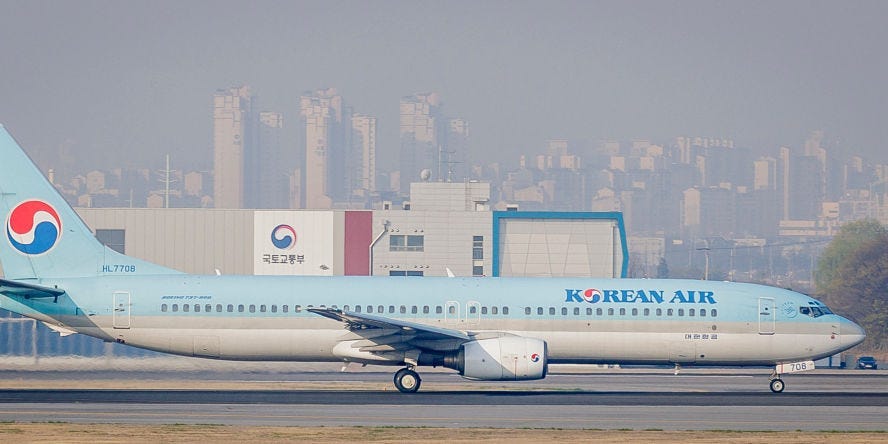A Korean Air flight bound for Taiwan had to turn back and make an emergency landing after detecting a fault with the aircraft’s pressurization system.
The Boeing 737 Max 8 plane departed from Incheon International Airport at 4:45 p.m. local time on Saturday, Yonhap News Agency reported.
A pressurization fault was detected while the plane was flying over South Korea’s southern Jeju Island, per Yonhap.
Roughly 30 minutes after taking off, the plane started descending sharply, dropping nearly 25,000 feet in five minutes, according to data from FlightRadar24.
Videos on social media show the campaign shaking and oxygen masks hanging from the ceiling.
Yonhap News Agency, citing information from the Ministry of Land, Infrastructure and Transport, reported that 15 passengers were hyperventilating and suffered from eardrum pain when the flight descended.
“We are fully cooperating with all relevant authorities to investigate the circumstances surrounding the incident,” a Korean Air spokesperson told Business Insider.
The spokesperson said 17 passengers were evaluated at medical facilities and were discharged without severe injuries.
The spokesperson added that the aircraft is just under 5 years old and was delivered to Korean Air in July 2022.
“Our commitment to the safety and well-being of our passengers and crew remains unchanged. We apologize to all affected by this incident,” the spokesperson said.
Passengers on the affected plane reached Taichung International Airport safely on Sunday via a different flight, the Taipei Times reported.
A week of plane chaos
The Korean Air news comes after a week in which multiple planes were forced to make emergency landings for various reasons.
On Thursday, a Malaysia Airlines plane was forced to turn around and head back to Hyderabad, India. A video showed its engine on fire, with sparks flying behind it.
Also, on Thursday, a United Airlines flight from Connecticut to Colorado was cut short after a piece of its engine cover fell off during takeoff.
Boeing planes have also been plagued by issues in recent months. In January, a door plug came off a Boeing 737 Max 9 Alaska Airlines jet at 16,000 feet, resulting in a gaping hole in the plane.
Several Boeing whistleblowers have since come forward with bombshell testimonies alleging that the company cut corners with quality control.
There have also been other instances of late where commercial planes encountered sudden drops in cruising altitude that resulted in injuries.
In May, a Singapore Airlines Boeing 777-300ER airplane encountered turbulence so severe that the plane dropped 178 feet in four seconds.
The flight from London to Singapore was cruising at an altitude of 37,000 feet over Myanmar when it was thrust up and down rapidly for 62 seconds, leading to one death and over 100 injuries.
Representatives for Boeing did not immediately respond to a request for comment from Business Insider sent outside regular business hours.
Read the full article here
















